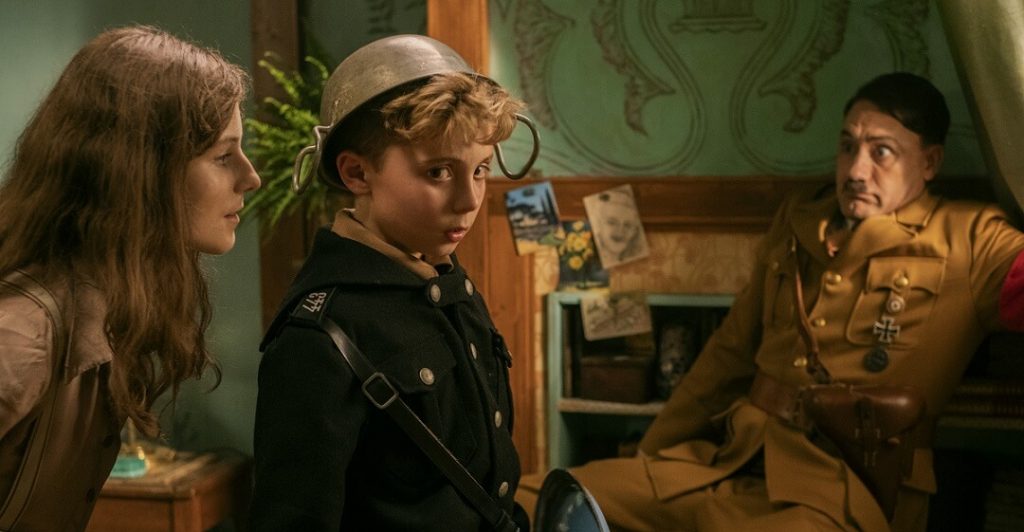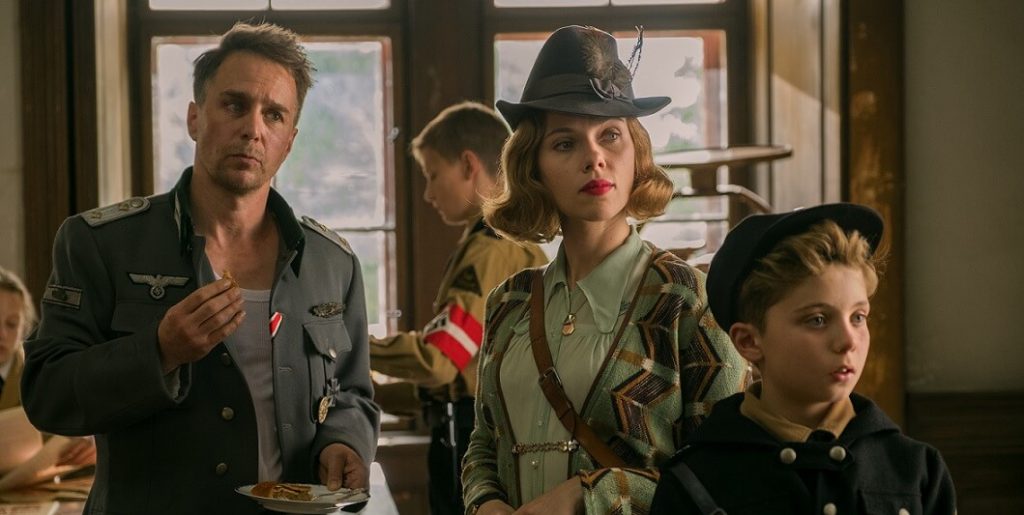Towards the end of the Second World War, Jojo (Roman Griffin Davis) is excited to join the Hitler Youth and go on a training camp. A fanatical young boy, Jojo is irredeemably loyal to the ideology of the Nazi Party – so much so that his imaginary best friend is a child’s impersonation of Adolf Hitler (Taika Waititi). However, Jojo is conflicted when he discovers his single mother Rosie (Scarlett Johansson) is harbouring a young Jewish girl, Elsa (Thomasin McKenzie) in their house.
Jojo Rabbit is written and directed by Taika Waititi, and also stars Sam Rockwell as Captain Klenzendorf, Rebel Wilson as Fraulein Rahm and Stephen Merchant as Gestapo officer Deertz.
Jojo Rabbit is utterly absurd, playing like a child’s fairy-tale which is rudely disrupted by the harsh realities with which Jojo is suddenly confronted. Alongside the caricature of the Nazis runs a more serious and heartfelt story. At the heart of this film is a sobering tale of the affects of propaganda on young minds, and a message to seek the truth first-hand, rather than relying on frightening Chinese-whisper rumours and politically-biased disinformation. Which is, of course, relevant today. Our political debates continue to refer to right-wing conservatives as Nazis, and we have witnessed the rise of self-proclaimed Neo-Nazi groups particularly in the U.S. Closer to home, the most recent Australian federal election was plagued by scare-campaigns and unchecked propaganda. This film is needed now more than ever, as many pro-Jojo critics have already professed.
 However, since its announcement, Jojo Rabbit has whipped up no small amount of controversy surrounding the subject of its satire. As a dark comedy, I actually expected the film to pack more of a punch to the gut. The basis for the film’s comedy seems to rest on the cause célèbre of Hitler being a child’s imaginary friend, and portrayed in a cutesy, quirky manner. In and of itself, this is a great premise. However, Hitler, and what he came to represent, is simultaneously so distant in history, yet so omnipresent in politics and internet culture, that a parody of his likeness is somehow a little benign. While the effects of WWII continue to impact the world three or four generations later, I think we’ve reached a point where Hitler is no longer so monstrously sacred that he can afford to be mocked more mercilessly in mainstream cinema. Previous satires have been more outrageously bold. Perhaps, as I don’t find the premise as controversial as many critics have, I find the subject to be fair game. Mocking the experience of Holocaust survivors, however, would be something else entirely.
However, since its announcement, Jojo Rabbit has whipped up no small amount of controversy surrounding the subject of its satire. As a dark comedy, I actually expected the film to pack more of a punch to the gut. The basis for the film’s comedy seems to rest on the cause célèbre of Hitler being a child’s imaginary friend, and portrayed in a cutesy, quirky manner. In and of itself, this is a great premise. However, Hitler, and what he came to represent, is simultaneously so distant in history, yet so omnipresent in politics and internet culture, that a parody of his likeness is somehow a little benign. While the effects of WWII continue to impact the world three or four generations later, I think we’ve reached a point where Hitler is no longer so monstrously sacred that he can afford to be mocked more mercilessly in mainstream cinema. Previous satires have been more outrageously bold. Perhaps, as I don’t find the premise as controversial as many critics have, I find the subject to be fair game. Mocking the experience of Holocaust survivors, however, would be something else entirely.
Waititi has done well to distinguish between mocking the ridiculousness of the Nazi propaganda and the proponents of hate, and maintaining a quiet respect around the plight of the Jewish people. He manages to find the right balance between recognising the horrors of WWII and satirising it. However, the transitions between these two parallel yet dichotomous narrative threads is sometimes jarring, and they never quite blend to be tragically hilarious, only tragic, then hilarious, then tragic again. Regarding the comedy itself, there are a few really solid laughs, and the rest remain low chuckles.
Some of the film, as many have and will comment, resembles an off-brand Wes Anderson film. It’s nice, comforting and quirky, but the film drifts in and out of this style, making the ‘ins’ blatant. Johansson shines in the role of savvy single mother Rosie, and the character is well-written and real, more than the bleeding heart usually found in WWII films. Rockwell is in his comedic element as an incompetent and dangerously apathetic captain, and Davis is equal parts charming and captivating in the role of Jojo.
Waititi’s portrayal of the Hitler Youth movement and German society’s engagement with the Nazi Party is perilous but honourable. So often are the Nazis the two-dimensional devils of every story, it’s easy to forget many supported the Nazi Party, and that Hitler’s power was technically legally acquired. Running on a platform of German pride and nationalism, no different to many political parties today, the National Socialist German Workers’ Party (NSDAP) was almost democratically elected. Jojo’s excitement to join the Hitler Youth and become a strong soldier for Germany is portrayed with all the accurate joy of a child swept up in idealistic nationalism and the desire to be part of a club. To not portray the human side of the Nazi indoctrination and adoration, seen as Jojo is torn between protecting Elsa and Rosie and being faithful to Hitler, is to suggest it could never happen again. To give it the air of myth and not recognise the human capacity to be taught to hate is dangerous. There is something deeply human about this film as a meta product, and the very existence of a modern black comedy about Hitler.
I rate this film 8/10.
Jojo Rabbit is out in Australian cinemas on Boxing Day.


